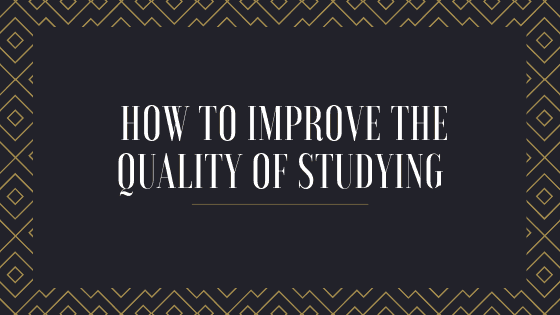Performance improvement or how to improve the quality of studying and its results
Education plays an important role in young people’s lives. A certificate with good marks and a degree form a prestigious educational institution may contribute to a successful career start. But a university life is not as easy as we would like it to be. This long and thorny path consists of ups and downs. Even the most talented and hard-working learners sometimes find themselves underperforming. It is important to have good self-analysis skills, understand the reasons for failure, and seek ways to overcome difficulties.
If you find it challenging to develop a correct learning strategy, this article from Pro-Papers should help you to make the first steps towards reaching full academic potential and achieving the highest marks you are capable to achieve.
Think positively
Some young people perceive learning responsibilities like torture. Low marks and professor’s criticism provoke disappointment, depression, the feeling of defeat, and distrust in their own capabilities. If you are feeling the same way, do not give up! Poor performance does not mean that you are lazy or not clever enough, as some educators may say. You just have to choose new learning approaches, look at a university from a new perspective, and get rid of negative thoughts.
Mistakes should be regarded as the opportunity to improve yourself, the unique chance to reach new development stages. Do not think that you are helpless and untalented. There is always something you may do, always some strengths which may compensate for weaknesses. Replace the phrase “I am a looser” with “I am going to do better”, and you will be surprised by amazing changes happening in your life.
Determine problematic areas
There are very few students who are bad in all disciplines. As a rule, there are only several tricky topics not allowing a person to understand a whole course and move forward. In order not to waste time and energy, determine the most problematic issues and elaborate them profoundly.
Write down your marks for the last several months and try to distinguish patterns. Are there problems with all subjects? Which assignments are the most challenging for you? Did you always study poorly or begin to fail recently? You are likely to have approximate answers to these questions even now. But it is still worth analyzing learning trends in detail to see the situation more clearly.
Next, think which factors could contribute to academic failure in areas you have identified. Are they of external or internal nature? Some students receive low grades because of family and health problems, bad emotional state. The thing may be in particular skill which should be boosted, for example, note taking or essay writing. Also, it is important to find the most suitable learning format and work at a comfortable pace.
Once you have determined adverse factors, start working on minimizing them. It may be difficult to solve external problems self-handedly. Consider seeking advice from a counsellor as an option. As for academic challenges, the tips below should help to address them.
Consult your professors
Educators are there not only to criticize but also support you. They may be your friends and not only strict observers. An experienced professor can determine your weaknesses and compile an individualized curriculum. In addition, the fact that you are interested in one’s discipline should contribute to improving interpersonal relationships. Educators are usually very pleased by additional attention and enjoy the opportunity to share knowledge.
Be active in a class
Try to use your on-campus time productively. Do not think about extraneous things, chat with friends in social media, and rewrite formulas from a blackboard without analyzing them. Stay focused, comprehend each professor’s word, keep neat notes which may be understood after some time. Do not be afraid to ask questions if there are some unclear details. Nobody will think that you are a slow learner, and a lecturer will appreciate your interest. It is much easier to get clarifications in a class than trawl through textbooks to fill in knowledge gaps.
Organize your life
You should be organized, track bad habits and get rid of them. Take a look at your workplace and assess whether it is tidy. Remove unnecessary things, put textbooks and notes in neat piles, choose places for all stationery items so that you can find them quickly.
The main problem of many young people boils down to the fact that they cannot find time for homework. At the first glance, it seems that lectures take little time, and the whole second part of a day is free. However, there are many distractions not allowing students to reach full potential: video games, social networks, TV, etc. Some learners simply procrastinate several hours and feel way too tired to perform assignments at night.
Compiling a daily schedule with prioritized educational tasks may be very helpful. After starting to approach your daily routine more responsibly, you will be surprised by a huge amount of time that was previously spent on trifles, receive more opportunities to work on problematic topics and improve academic results.
Train your memory
Young people absorb new information every day. It is not surprising that there is a mess is their heads. Even those who understand lecture material often struggle to memorize facts, dates, and arguments, feel dumbstruck in a stressful exam environment. It makes sense to study memory training techniques.

Hey, my name is Peter and I’m the author of this website and all the content on this page. I have been a debater, a debate trainer, debate tournament organizer and everything else with a debate prefix for more than 10 years and I’ve seen it all. I want to help everyone to be a better debater and if you want to help too, please let me know. Keep on debating!

